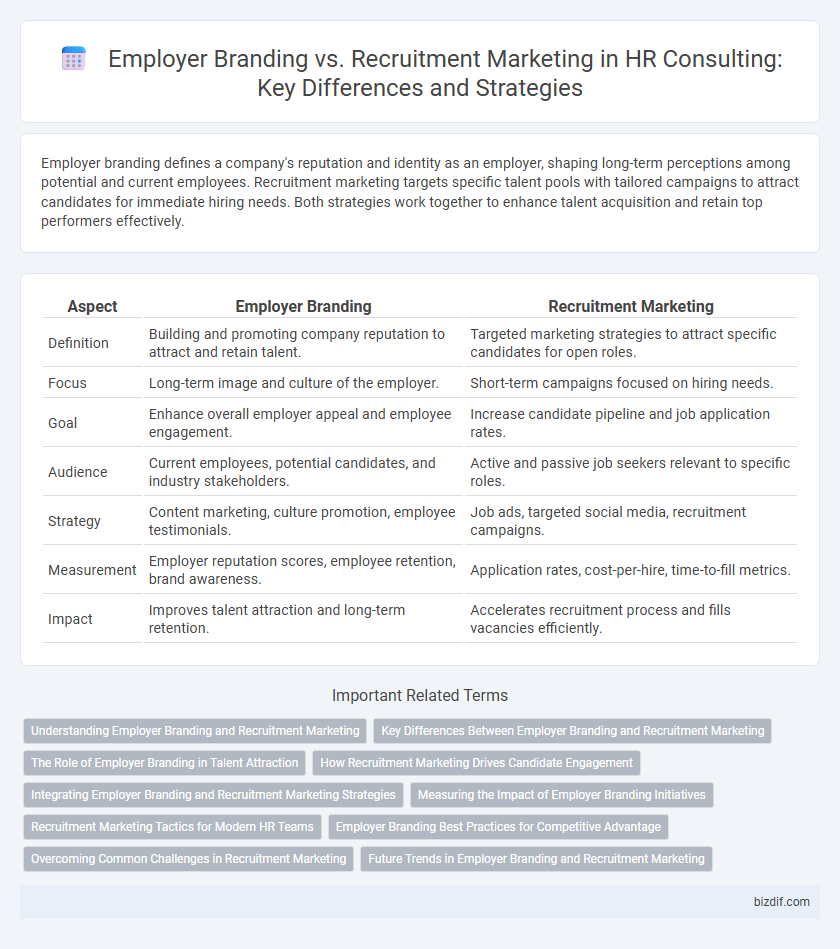Employer branding defines a company's reputation and identity as an employer, shaping long-term perceptions among potential and current employees. Recruitment marketing targets specific talent pools with tailored campaigns to attract candidates for immediate hiring needs. Both strategies work together to enhance talent acquisition and retain top performers effectively.
Table of Comparison
| Aspect | Employer Branding | Recruitment Marketing |
|---|---|---|
| Definition | Building and promoting company reputation to attract and retain talent. | Targeted marketing strategies to attract specific candidates for open roles. |
| Focus | Long-term image and culture of the employer. | Short-term campaigns focused on hiring needs. |
| Goal | Enhance overall employer appeal and employee engagement. | Increase candidate pipeline and job application rates. |
| Audience | Current employees, potential candidates, and industry stakeholders. | Active and passive job seekers relevant to specific roles. |
| Strategy | Content marketing, culture promotion, employee testimonials. | Job ads, targeted social media, recruitment campaigns. |
| Measurement | Employer reputation scores, employee retention, brand awareness. | Application rates, cost-per-hire, time-to-fill metrics. |
| Impact | Improves talent attraction and long-term retention. | Accelerates recruitment process and fills vacancies efficiently. |
Understanding Employer Branding and Recruitment Marketing
Employer branding shapes an organization's reputation as an employer by highlighting its values, culture, and employee experience to attract long-term talent loyalty. Recruitment marketing targets potential candidates through specific campaigns and content designed to fill immediate job openings efficiently. Understanding the distinction empowers HR professionals to craft strategic initiatives that enhance both company image and candidate acquisition success.
Key Differences Between Employer Branding and Recruitment Marketing
Employer branding focuses on shaping and communicating a company's identity and culture to build a long-term reputation as an attractive employer, emphasizing values, mission, and employee experience. Recruitment marketing targets specific campaigns and strategies to attract and engage potential candidates for immediate hiring needs, utilizing channels like job ads, social media, and talent pools. Employer branding builds a sustainable talent pipeline by creating emotional connections, while recruitment marketing drives candidate conversion through actionable outreach efforts.
The Role of Employer Branding in Talent Attraction
Employer branding establishes a company's identity and reputation as an employer, emphasizing culture, values, and employee experience to attract top talent. Recruitment marketing leverages targeted campaigns and digital channels to promote job openings and engage potential candidates actively. Strong employer branding enhances trust and long-term candidate engagement, making talent attraction more effective and sustainable.
How Recruitment Marketing Drives Candidate Engagement
Recruitment marketing leverages targeted campaigns and compelling content to attract and engage potential candidates by showcasing the employer's unique value proposition and culture. This approach uses data-driven strategies and social media platforms to create personalized candidate experiences, increasing application rates and quality of hires. Effective recruitment marketing aligns closely with talent acquisition goals, ensuring the right messages reach the right audience at critical decision points in the candidate journey.
Integrating Employer Branding and Recruitment Marketing Strategies
Integrating employer branding and recruitment marketing strategies enhances talent acquisition by aligning company culture messaging with targeted candidate outreach. Consistent employer brand narratives across recruitment channels boost candidate engagement, trust, and quality of hires. Leveraging data-driven insights ensures that branding efforts resonate with desired talent pools, optimizing recruitment efficiency and employer reputation.
Measuring the Impact of Employer Branding Initiatives
Measuring the impact of employer branding initiatives involves analyzing key metrics such as employee engagement, retention rates, and candidate quality to assess alignment with recruitment marketing efforts. Data-driven insights from social media analytics, career site traffic, and employee reviews provide a comprehensive view of brand perception and influence on talent acquisition. Integrating these measurements helps HR consultants optimize strategies to enhance both employer branding and recruitment marketing effectiveness.
Recruitment Marketing Tactics for Modern HR Teams
Recruitment marketing tactics for modern HR teams leverage social media campaigns, targeted job advertisements, and employer value proposition content to attract top talent. Utilizing data analytics and candidate personas enhances the precision of outreach efforts, increasing engagement and application quality. Employee testimonials and interactive career sites further strengthen recruitment marketing by showcasing authentic workplace culture and growth opportunities.
Employer Branding Best Practices for Competitive Advantage
Employer branding best practices include consistently communicating a clear employer value proposition (EVP) that aligns with company culture and employee experience to attract top talent. Leveraging authentic employee testimonials and maintaining a strong presence on social media platforms enhances credibility and engagement. Investing in employee development and recognition programs reinforces brand reputation, driving long-term competitive advantage in the talent market.
Overcoming Common Challenges in Recruitment Marketing
Overcoming common challenges in recruitment marketing requires a strategic approach that aligns employer branding with targeted outreach efforts. Addressing issues like inconsistent messaging, low candidate engagement, and insufficient use of data analytics enhances the effectiveness of talent acquisition campaigns. Leveraging social media platforms, employer value propositions, and personalized candidate experiences strengthens recruitment marketing outcomes while maintaining employer brand integrity.
Future Trends in Employer Branding and Recruitment Marketing
Future trends in employer branding emphasize authentic storytelling and personalized employee experiences to attract top talent in competitive markets. Recruitment marketing increasingly leverages AI-driven analytics and programmatic advertising to target niche candidate segments with precision. Integrating data-centric strategies and employee value propositions enhances both employer brand visibility and candidate engagement throughout the talent acquisition lifecycle.
Employer branding vs recruitment marketing Infographic

 bizdif.com
bizdif.com